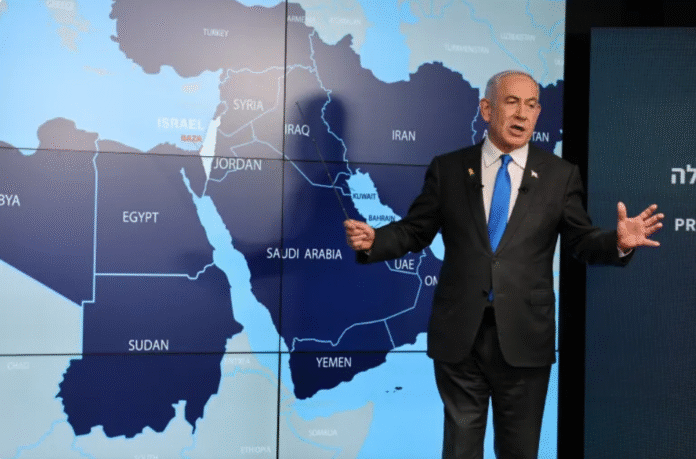Greater Israel Remark Condemned by Arab and Islamic Nations
The Greater Israel remark condemned by Arab and Islamic countries has sparked intense outrage across the Middle East. In a unified response, 31 Arab and Muslim nations along with leading regional organizations, denounced Israeli Prime Minister Benjamin Netanyahu’s controversial endorsement of the “Greater Israel” vision, calling it a direct threat to Arab security, sovereignty, and international peace.
During a recent interview on i24NEWS, Netanyahu was asked whether he supported the concept of a “Greater Israel.” Without hesitation, he replied, “Absolutely. Very much.” This statement has reignited concerns over Israel’s expansionist ambitions, which historically include claims to the occupied Palestinian territories, Gaza, parts of Lebanon, Syria, Egypt, and even Jordan.
Why Arab Nations Condemned the Greater Israel Remark
In their joint declaration, the coalition emphasized that Netanyahu’s words represent a blatant violation of international law and undermine the foundations of global diplomacy. According to the Arab League, the Organisation of Islamic Cooperation (OIC), and the Gulf Cooperation Council (GCC), the statement also threatens Arab national security and sovereignty in ways that could destabilize the entire region.
“These remarks are a direct threat to Arab national security, to the sovereignty of states, and to regional peace,” the coalition’s statement read.
The condemnation was further reinforced by outrage at Israeli Finance Minister Bezalel Smotrich’s announcement to advance settlement expansions in the occupied West Bank. Arab leaders labeled these moves as illegal, provocative, and destructive to the peace process.

Greater Israel Remark Condemned: Impact on Palestinian Rights
The Greater Israel remark condemned by Arab and Islamic leaders also underscores the violation of Palestinian rights. Settlement expansion is seen as a direct assault on the Palestinians’ right to an independent and sovereign state, based on the 1967 borders with East Jerusalem as its capital.
Smotrich declared that thousands of new settlement housing units would be approved, proudly claiming the decision would “bury the idea of a Palestinian state.” Such words, paired with Netanyahu’s Greater Israel endorsement, have deepened fears that Israel is not only rejecting peace but actively working toward permanent annexation of occupied lands.
The coalition responded firmly: “Israel has no sovereignty over Palestinian territory. Its actions violate international law and strip Palestinians of their inalienable rights.”
International Law and United Nations Position
The condemnation also ties into recent global rulings and UN resolutions. In September 2024, the United Nations General Assembly (UNGA) passed a resolution urging Israel to end its occupation within 12 months. Supporting this, the International Court of Justice (ICJ) declared Israel’s ongoing presence in Palestinian lands as unlawful.
In February 2024, the ICJ went further, stating Israel was “plausibly committing genocide” in Gaza. While the final verdict is pending in a case brought forward by South Africa, the Arab and Islamic coalition referenced these rulings as proof of Israel’s continued violations of international law.
Greater Israel Remark Condemned Amid Gaza War
The Greater Israel remark condemned by Arab leaders comes during Israel’s devastating 22-month-long war on Gaza. Reports confirm over 61,800 Palestinians killed and more than 155,000 wounded. Netanyahu recently announced plans to fully occupy Gaza City, while simultaneously suggesting Palestinians could “leave” Gaza.
Human rights organizations described this as disguised ethnic cleansing, echoing the trauma of the 1948 Nakba, when over 700,000 Palestinians were forced from their homes. Calls for the resettlement of Palestinians outside Gaza have only heightened fears of mass displacement.
Unified Arab-Islamic Response
The coalition’s statement, representing countries from across the Arab and Islamic world, strongly rejected any attempts to displace Palestinians. They declared:
-
Absolute rejection of forced displacement under any circumstances.
-
Condemnation of genocide and ethnic cleansing in Gaza.
-
Demand for unconditional humanitarian aid access to end starvation tactics used as weapons of war.
-
Urgent call for ceasefire and Israel’s complete withdrawal from Gaza.
This strong wording shows that Netanyahu’s comments did not just provoke political debate, they triggered a serious diplomatic crisis across the Middle East.
Why This Condemnation Matters
The Greater Israel remark condemned by Arab nations is more than symbolic outrage. It reflects a critical moment in regional geopolitics, where international law, sovereignty, and human rights are all at stake. Netanyahu’s words threaten to escalate already fragile tensions, making peace and stability in the region more elusive.
For Arab states, the statement is also a warning to the global community: ignoring Israel’s expansionist rhetoric could open the door to more wars, displacement, and instability that stretch far beyond Palestine.

Conclusion
The Greater Israel remark condemned by Arab and Islamic nations stands as a powerful message of resistance against expansionist ideologies and illegal occupation. At a time when Gaza suffers catastrophic human loss, such statements from Israeli leadership only inflame tensions and invite stronger regional unity against Israel’s policies.
This growing coalition of Arab and Muslim voices sends a clear signal: peace cannot be achieved by threats, annexations, or ethnic cleansing, but only through justice and recognition of Palestinian rights.

